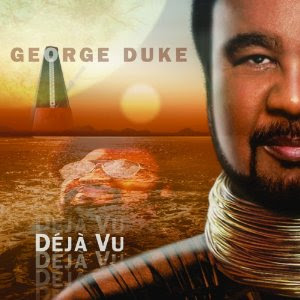 Larry and Tak’s new record is taking Japan by storm; can it do the same in the U.S.?
Larry and Tak’s new record is taking Japan by storm; can it do the same in the U.S.?
The five new albums below were chosen for a Quickies together mainly because they’re fusion-type records. Beyond that, they are also by artists who I’ve followed for a while or used to follow and I’m just interested to find out what they’ve been up to these days.
The first three I go all the way back with to the 70s. Larry Carlton was my main guitar hero as the decade closed and several years into the next one. Stanley Clarke was my electric bass hero at around the same time. George Duke wasn’t my keyboard hero, but he made a few records in that era that weren’t bad for crossover jazz, and he could always lay down a nasty synth solo when the need arose.
The other two guys examined here came along much later. Charlie Hunter is one of the more unpredictable and creative guitarists of the last 15 years. He’s made a few records along the way that have rocked my world, his self-titled one being among them. Stanton Moore is better known as the drummer for the New Orleans funk-jazz-hip-hop band Galactic, but I always liked Moore’s other projects, like Garage A Trois much better.
So did these guys get better with age, or are they too far past their prime? The answers lie somewhere in between those two extremes, at varying points:
Larry Carlton & Tak Matsumoto Take Your Pick: The author of many unforgettable guitar licks (“Kid Charlemagne,” anyone?), Carlton’s flawless guitar technique is part blues, part jazz, part rock and all taste. But all the studio work he did in the 70s and 80s for the likes of Joni Mitchell, Steely Dan, Michael Jackson, Andy Williams and more (as well as being a multi-Grammy winner), didn’t do much to make him a household name in the States. Japan is a different story, where he’s recorded at least three live albums led or co-led. One of them, Mr. 335 Live In Japan, (1979) remains available only as an import, as far as I know. Japan’s love affair with Carlton continues to this day it would seem, as Carlton teamed up with Japanese guitar sensation Tak Matsumoto for a collaborative record Take Your Pick. Like Mr. 335, this one is a Japan-first/only release and while the record first shipped about a month ago, it’s still only available stateside as an import.
Matsumoto brings a heavy rock pedigree to the table as leader of the Nippon rock band the B’z, but his fusion side comes out more for this album and his cultivated style meshes well with Carlton’s. This record reminds me so much of Carlton’s 1995 collaboration with Lee Ritenour, that it could almost be called Larry & Lee, Part 2. Or more accurately, Larry & Tak. In other words, it’s a guitar album that won’t dazzle you with flashy, in-your-face playing, but might satiate your soul with some highly polished fretwork. The whole sonic landscape might be too polished to avoid it being called “smooth” jazz, but as far as that genre goes, this is probably as good as it gets these days.
Stanley Clarke The Stanley Clarke Band Featuring Hiromi: Electric/acoustic bassist extraordinaire Stanley Clarke again revisits his fusion past in a continuation of 2007’s The Toys Of Men. In a way, it’s also an extension from last year’s acoustic trio Jazz In The Garden, because Japanese piano wunderkind Hiromi Uehara is held over from that trio and despite only playing a part-time role still gets the “featuring” billing in the new Stanley Clarke Band. Ronald Bruner (drums) and Rusian Sirota(keys) are carried over from the Toys band, but there’s plenty of guest guitarists, horn players and vocalists. Return To Forever and Jazz In the Garden cohort Lenny White serves as the album’s producer along with Clarke himself.
The Stanley Clarke Band Featuring Hiromi, first and foremost, is real fusion, no smooth jazzin’ here. The playing is virtuosic starting with Clarke, and the compositions are ambitious or fun and occasionally, both. The program is nice and varied. Clarke even hauls out the old talk box for some tracks and makes it sound as funky as it did during the bell-bottom days. “I Wanna Play For You Too” is what I’m talkin’ about when it comes to old-school funk and the remake of Return To Forever’s “No Mystery” does the elaborate piece justice. Occasionally the ambition goes a little too far (“Sonny Rollins”), but the collection is devoid of cringe-inducers. The Stanley Clarke Band, out since June 15, offers proof once again that Stanley Clarke can still deliver a substantial jazz fusion record whenever he sets his mind to it.
 George Duke Déjà Vu: The image behind Duke’s right shoulder on the album cover provides a hint of this record’s intent. As it is a picture taken from the cover of his 1980 lp A Brazilian Love Affair, Déjà
George Duke Déjà Vu: The image behind Duke’s right shoulder on the album cover provides a hint of this record’s intent. As it is a picture taken from the cover of his 1980 lp A Brazilian Love Affair, Déjà
Vu likewise seeks to mine a light, jazzy and (occasionally) Brazilian groove. “A Melody” does take cues from the sounds of Rio as does a few other tunes like “Bring Me Joy,” but other tracks stray off the South American script, such as the Sly Stone/Al Green inspired “You Touch My Brain” or the quiet storm of “Come To Me Know” or the David Sancious brand of rock-jazz that is “Déjà Vu.”
The real theme seems to be a conscious return to the r&b/jazz of his heyday. But then again, there’s decidedly contemporary tracks like “6 O’Clock Revisted.” So, what’s the theme again? Oh yeah, the theme of Déjà Vu is that it’s a George Duke record.
Yeah, that works. Déjà Vu will go on sale in August.
Charlie Hunter Gentlemen, I Neglected To Inform You You Will Not Be Getting Paid: An immediate finalist for Album Title of the Year. Album of the Year? Well, not quite. Hunter records have been hit-or-miss since his masterpiece self-titled one ten years ago. His last CD Baboon Strength was sheer delight, even as it’s possibly his most accessible. The one before it, Mistico, eh not so much. If there’s really a pattern then Gentlemen should be an “off” album, and that’s pretty much how it comes off to my ears.
Typically, Hunter structures his sound around a core duo of his 8-string guitar/bass and drums, augmenting it with keyboards, or perhaps a horn or two. This time out, he and drummer Eric Kalb are augmented by a Stax-style horn section consisting of two trombones and and trumpet. He hadn’t quite done this before but came fairly close (i.e., one trombone and one sax). Nonetheless, this still feels like primarily a guitar/bass/drums venture because the brass don’t do much past adding some non-obtrusive charts for coloration. It is enough to give the record some soul, but in the end, Hunter is letting the songs carry the day. The problem is, most of the songs aren’t the clever, compelling examples he used to effortlessly crank out. There’s no out-and-out clunkers, and “You Look Good In Orange” is a nice ditty but most of the songs plod along and at times Hunter seems bored. I’m disappointed but at the same time, I know his next album should be killer. Charlie Hunter doesn’t make two mediocre records in a row.
 Stanton Moore Groove Alchemy: Moore’s 2002 offering Flyin’ The Koop was zany fun with serious craftsmanship; a minor classic of the acid jazz idiom. Since then, he’s settled on a more established strategy of a drums/B-3/guitar trio with Robert Walter and Will Bernard, and for the third record in a row, that’s the lineup Moore has employed for Groove Alchemy. It’s worked before and Stanton clearly saw no need to tamper with the formula.
Stanton Moore Groove Alchemy: Moore’s 2002 offering Flyin’ The Koop was zany fun with serious craftsmanship; a minor classic of the acid jazz idiom. Since then, he’s settled on a more established strategy of a drums/B-3/guitar trio with Robert Walter and Will Bernard, and for the third record in a row, that’s the lineup Moore has employed for Groove Alchemy. It’s worked before and Stanton clearly saw no need to tamper with the formula.
There’s something about this record that sets it apart from 2008’s predecessor Emphasis! (On Parenthesis), though.The grease factor is pushed even further out, resulting in a record that can sometimes be mistaken for an early Meters LP. “Squash Blossom” immediately sets that organ-heavy Big Easy funk tone for most of the album. Once again, Moore doesn’t solo but his breaks are so lethal he doesn’t need to. Walter’s big B-3 sound fills up most of the melodic space, acting as a hybrid between Big John Patton and Rod Argent. Bernard’s unique blues-based style fits right in, too. And just when the songs begin to sound too much alike, Walter switches to piano and does a credible ‘Fess impersonation of the Nola styled blues of “Keep On Gwine.” “Up To Here” goes for blues-rock grit. But Moore uncorks his big surprise at the end with a doleful but resolute gospel tinged version of George Jones’ “He Stopped Loving Her Today.” Groove Alchemy hit the streets on April 13
- Ivo Perelman + Tom Rainey – ‘Duologues 1-Turning Point’ (2024) - May 10, 2024
- Jeff Oster, Vin Downes + Tom Eaton – ‘Seven Conversations’ (2024) - May 6, 2024
- David Torn – ‘Adityahridayam 321’ (2024) - May 5, 2024




